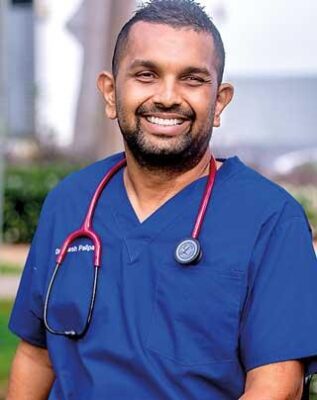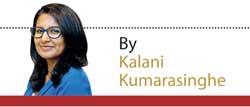‘Impossible is just a state of mind’ – Dr. Dinesh Palipana-by Kalani Kumarasinghe

Source:Dailymirror
Sri Lankan born Dr. Dinesh Palipana was recently named as Queensland’s Australian for the year 2021. The state’s first quadriplegic medical graduate and medical intern, Dr. Palipana was honoured at a special ceremony held in Brisbane. An advocate for inclusivity and equitable treatment of people with disabilities, Dr. Palipana is now a Senior R

esident Doctor at Gold Coast University Hospital, and also a qualified Lawyer. Daily Mirror caught up with Dr. Palipana in the middle of a busy night at the Emergency Department of the Hospital to discuss his journey so far. Excerpts of the interview:
Q Tell us about where you started?
I was born in Kandy. We moved around a lot because my dad was an Engineer for the Water Board. We moved to Australia when I was ten years old, and I grew up here since then.
Q Did you always want to be a doctor?
No, I didn’t actually. I went to study Law first and I finished my Law Degree, but then it was after that I decided I want to be a doctor. I went through some health issues myself and I was going through a period where I had depression. It was a dark time for me. But through that time, I had the opportunity to think about life a bit, and I thought about what I wanted to do with my life and that’s when I decided that I wanted to be a doctor. I came across so many doctors and realised that you can make a big difference in someone’s life. That’s how I ended up in medical school. I finished Law and then I sat for the medical school entrance test, I did the interview and I got a spot.
Q How did the accident change your life?
The accident happened in 2010, I was 24 or 25. My car lost control on a wet road, after hitting something on the road. It rolled, when the car landed, I couldn’t feel or move my legs. I couldn’t feel my body or move my fingers.
In a second, my life changed forever. It was obviously one of the hardest things that ever happened to me. Everything fell apart, not just my body, my family fell apart. We lost our home and every single thing became very difficult.
I spent nearly 7 or 8 months in hospital. I was in intensive care for about a week. Early on I couldn’t speak a full sentence or move my arms like I do now. I couldn’t sit without losing consciousness.
Q How did you cope?
It was really hard, it was obviously the hardest thing that I have ever had to go through. I was taking one day at a time. I was lucky because I had some really good friends and my mom. The people around me made the journey a lot easier. But it was hard. I think you just had to keep going, there was no choice. You can either give up or keep going, and I just kept going. But it was hard, it was a roller-coaster of emotions and it took a long time.
Q Despite this you decided to continue your education…
I had the accident in 2010 and it took nearly four years. Nearly one year was in hospital and then I had some other complications. We spent another four or five in hospital in total over the next couple of years. My mom and I, we had a bunch of good friends. We had to build up our finances, we moved around a lot, it was a very challenging couple of years. But I really wanted to come back and be a doctor because I love it so much.
In 2014 I came back, but it wasn’t easy. Fortunately the University was very supportive. But I had to learn how to do a lot of things like hold my stethoscope, learn how to examine a patient. It took a lot of work. There were times that I woke up at 3 a.m. and went to bed at 11 p.m. Then just sleeping for a few hours, before getting up again and studying.
In 2016 I finished medical school, and I started working in 2017.
Q How did the work environment help?
I’m fairly independent now. I do most of my work myself. I work in the Emergency Department, which is the busiest Emergency Department in Australia. We have a great team. It’s a very team-oriented environment so it makes work easy, but to a large extent I’m fairly independent and I’ve learned to do a lot of things myself. But to learn how to do all these things, the university and everyone were so very supportive.
Q You have been advocating for “inclusivity”, how did you start?
It was through my own experiences. When I finished medical school it was very tough to get my first job. I think, around the world, people with various different abilities, struggle because there are prejudices, there are these ideas about what they can and can’t do. But I’m a doctor today, I work in the emergency department, I’m spinal cord injured, I can’t use my fingers but still I work as a doctor and do all these other things, so why can’t anyone else pursue their dreams? There’s no reason. We should include people in society, regardless of what their physical differences are, what their gender or ethnicity is. It’s not just the right thing to do, but there are so many other benefits as well.
Q How does it feel to be Queensland’s Australian of the year?
It’s such an honour. I’m really grateful for my life, my mom, and the community. This just means so much to reach this milestone. I hope that it allows me the ability to do more for people in our community. It’s amazing, and it’s surreal.
Q What advice would you give to Sri Lanka?
I think there are lots of policies and laws, like we have the United Nations Treaty for people with disabilities. But it’s really up to each and every one of us. If you’re an employer, please think about giving someone a try and giving them equal consideration, as someone who doesn’t have physical differences. If you’re an educator in a university or school, try and open up your mind and think about educating everyone, and giving everyone a chance. Because education is so powerful and important. Even if you’re a member of the community, just try to include people. You can have all the laws and all the policies in the world, but if people aren’t doing the right thing, then it’s meaningless. So we really have to believe and work towards doing the right thing.
Q What would you say to someone, who might feel they’re against the impossible?
Impossible is just a state of mind. It’s not a definite. Impossible is only impossible if you think that it’s impossible. Nothing is impossible. Just think about the possible.







